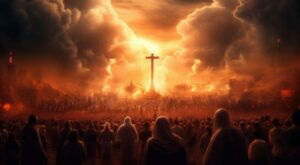Israeli Prime Minister Benjamin Netanyahu is nearing a decision on an Iran strike. As he does so, he will soon come to the United States. The Israeli leader and his top national security team will meet with President Obama at the White House on Sept. 30. The premier will then address the U.N. General Assembly on Oct. 1.
Netanyahu’s expressed mission: to persuade the U.S. and Western powers to intensify—not ease up on—pressure on Iran to give up its pursuit of nuclear weapons and the fuel to build them.
The big question: Is Netanyahu’s real mission to prepare the world for war?
Admittedly, there has been talk of such a war numerous times in recent years. But few realize just how close Netanyahu was to ordering the attack.
Media reports indicate that Netanyahu and then-Defense Minister Ehud Barak were ready to order a strike on Iran in 2010 but faced stiff opposition from the head of Mossad and other top defense and intelligence officials and thus backed off.
On Aug. 2, 2012, readers of myy blog will recall that I wrote this column: “Could Israel Strike Iran in September/October? Ahmadinejad Calls for ‘Annihilation’ of Israel; Netanyahu Warns U.S. Time Is Running Out to Stop Iran.”
Just last month, a former senior Israeli official confirmed that Netanyahu was, in fact, extremely close to ordering an attack on Iran in the fall of 2012—with the support of top Israeli defense and intel officials—but was pressured not to do so by President Obama.
Israel’s former National Security Advisor Giora Eiland “discussed the Israeli plan and Washington’s objections during a closed conference two weeks ago, saying that Netanyahu had originally intended to order a strike on Iran sometime between September and October of 2012, at the height of the US presidential campaign and around the same time as Netanyahu’s famous speech at the United Nations,” reports the Times of Israel.
The article continues, “The report claimed that Netanyahu was requested by the Obama administration to call off the attack, possibly so as not to interfere with the American electoral process.
“The former general was quoted as saying that although Israel is not controlled by the US, it does take American considerations into account with regard to issues of global significance.
“‘On many subjects Israel can perform independently,’ Eiland was quoted as saying. ‘The construction in Jerusalem, the attack on Gaza as well as other regional issues—we don’t need to ask the Americans before we take action, even if they don’t like it. But, when an issue involves something of American interest, we cannot act against their will.’
“However, ‘changing times’ could allow for an Israeli strike in the future, Eiland reportedly said, also noting that in light of Washington’s apparent lack of appetite for military action in Syria, the chances of an American strike in Iran were slim.”
In Oct. 2012, then, Netanyahu famously declared before the U.N. General Assembly that Iran would likely reach the “red line” between spring and summer 2013. He indicated if the world did not take decisive action, Israel would have to.
Since then, while the U.S. and Western powers have increased economic sanctions, the Iranians have not stopped enriching uranium. To the contrary, they have continued making nuclear weapons fuel, hardening their facilities and moving steadily toward an arsenal of nuclear warheads and the missiles to deliver them.
I believe, therefore, that Netanyahu and his team have been steadily preparing—once again—for war with Iran. In July 2013, as you may recall, I wrote a blog headlined “Has the End Game Begun? Privately, Senior Israeli Officials Now Warning Iran War Could Come in 2013. Netanyahu Preparing Public.”
Jerusalem’s concerns have since been affected by two developments:
- The emergence of new Iranian President Hasan Rouhani in early August, which seems to be lulling the Obama team into a false sense that Tehran is moderating and becoming more willing to cooperate.
- The use of chemical weapons in Syria by the Assad regime—and President Obama’s weak, dithering, vacillating approach toward the Syrian crisis—which has further worried the Israeli government and caused it to believe maybe Israel really has no choice but to act on its own.
“It is not exactly starting off as a happy New Year in Jerusalem,” I noted in a Sept. 5 column for National Review Online. “Prime Minister Benjamin Netanyahu and his security cabinet are mortified by what they are seeing unfold—not in Damascus, but in Washington.
“To be sure, Israeli leaders are concerned but not surprised by the horrific blood-letting that is underway between the evil Assad regime and the demonic forces of al-Qaeda and their radical Islamic partners. But the Israelis are stunned and dismayed by the vacillating, lurching, confused, and chaotic approach to decision-making of President Obama and his top advisers. …
“Behind the scenes, Netanyahu and his team have never felt more alone.
“If President Obama is so distrusted by the American people and her representatives in Congress that he cannot build solid support for limited military strikes against Syria’s chemical-weapons facilities, the Israelis are coming to the painful realization that there is no chance for the president to pull together support for preemptive military action against Iran’s nuclear facilities. Zero. Nada. Zilch.”
This is the backdrop for Netanyahu’s upcoming trip to the U.S. to meet with top administration officials and address the international community. And despite all the talk in recent weeks about Syria, Netanyahu is signaling in advance his focus remains Iran above all else.
“In a week and a half, I will go to the United Nations General Assembly, and before that I will meet with President Obama. I intend to focus on stopping Iranian nuclear program. Really stopping the nuclear program,” Netanyahu said at a cabinet meeting Tuesday, according to a report by the Times of Israel.
“The prime minister presented four criteria for doing so: ’1. Halting all uranium enrichment; 2. Removing all enriched uranium; 3. Closing [the Fordo enrichment facility at] Qom; and 4. Stopping the plutonium track,’” noted the Times. “Evidently responding to suggestions that the US might be willing to lift or reduce some sanctions on Iran in return for diplomatic progress, Netanyahu added: ‘Until it is genuinely stopped, the pressure on Iran must be stepped up, not eased or reduced.’ On Monday, the German news magazine Der Spiegel reported that Iran was willing to close its uranium enrichment facility at Fordo in return for an easing of Western sanctions.
“Quoting an intelligence source, the magazine reported that Iran’s new president, Hasan Rouhani, might consider closing down the heavily fortified Fordo facility, near the holy city of Qom, and allow international observers to supervise the destruction of the centrifuges, if the West were to lift the sanctions regime it has placed on Iran’s oil industry and central bank. Rouhani could make the offer later this month at the United Nations General Assembly, the report said.”
The Times also reported:
- On Sunday, the prime minister met with U.S. Secretary of State John Kerry in Jerusalem following the joint Russia-U.S. deal announced Saturday regarding Syria’s chemical weapons stockpile.
- In comments aimed at his hosts, Kerry said the deal, if successful, “will have set a marker for the standard of behavior with respect to Iran and with respect to North Korea and any rogue state, [or] group that tries to reach for these kind of weapons.”
- Netanyahu thanked Kerry for his efforts to purge Syria of chemical weapons and linked the agreement with Syria to the ongoing campaign to curb Iran’s controversial nuclear program.
“We have been closely following—and support—your ongoing efforts to rid Syria of its chemical weapons,” Netanyahu said Sunday. “The Syrian regime must be stripped of all its chemical weapons, and that would make our entire region a lot safer.
“The world needs to ensure that radical regimes don’t have weapons of mass destruction because as we’ve learned once again in Syria, if rogue regimes have weapons of mass destruction, they will use them. The determination the international community shows regarding Syria will have a direct impact on the Syrian regime’s patron, Iran. Iran must understand the consequences of its continual defiance of the international community, by its pursuit toward nuclear weapons … if diplomacy has any chance to work, it must be coupled with a credible military threat.”
Will Netanyahu order an attack on Iran? This remains to be seen, but signs are pointing in that direction.
Yet again, we need to pray for peace but be prepared for the possibility of another war in the epicenter.
Joel C. Rosenberg is the author of numerous New York Times best-selling novels and nonfiction books, with nearly 3 million copies sold. He is also the founder of the Joshua Fund (www.joshuafund.net). His books include The Last Jihad (2002), The Last Days (2003), The Ezekiel Option (2005) and The Copper Scroll(2006).
For the original article, visit joelrosenberg.com.
See an error in this article?
To contact us or to submit an article




















